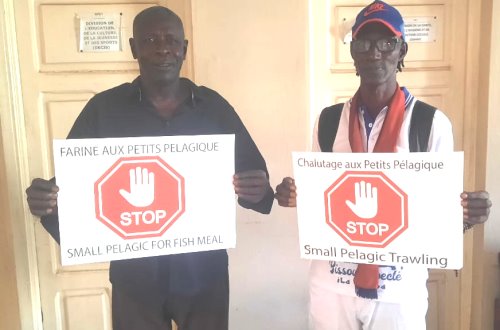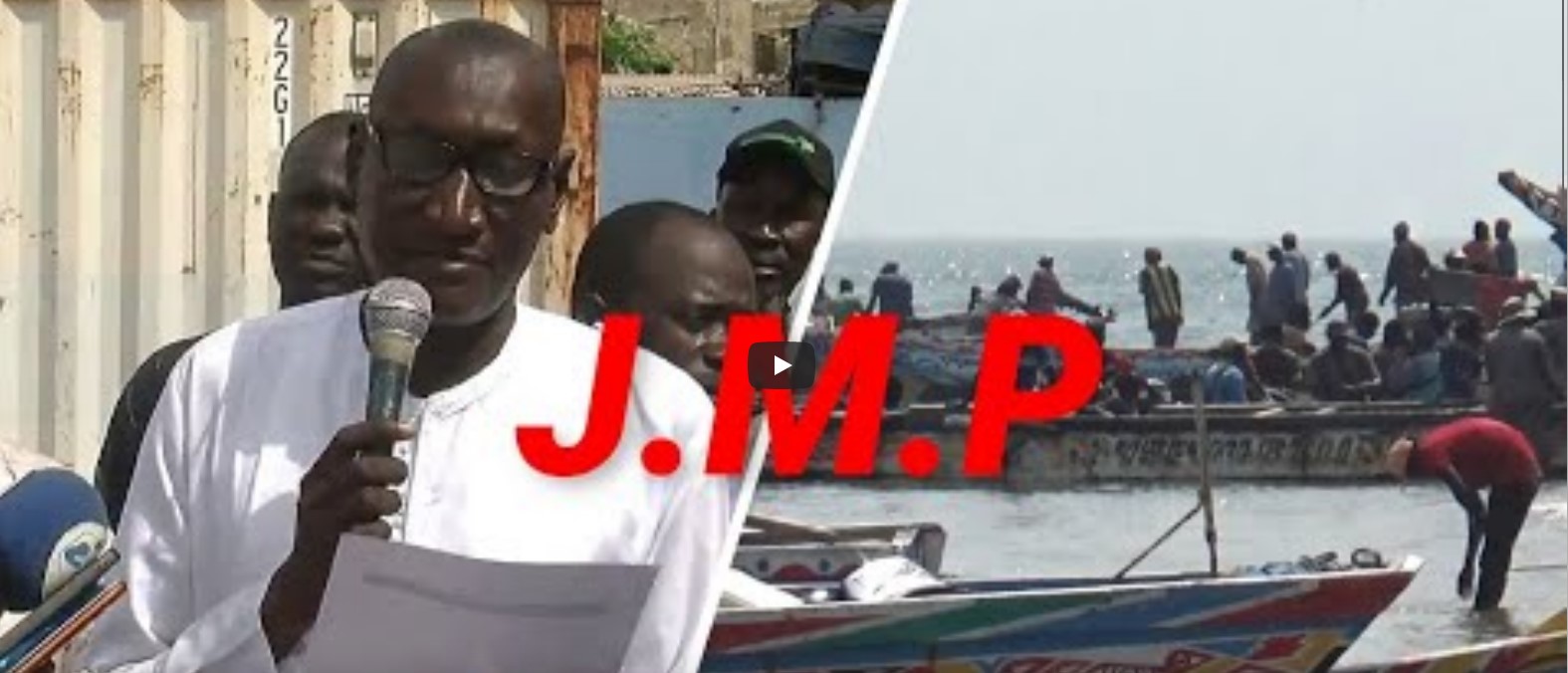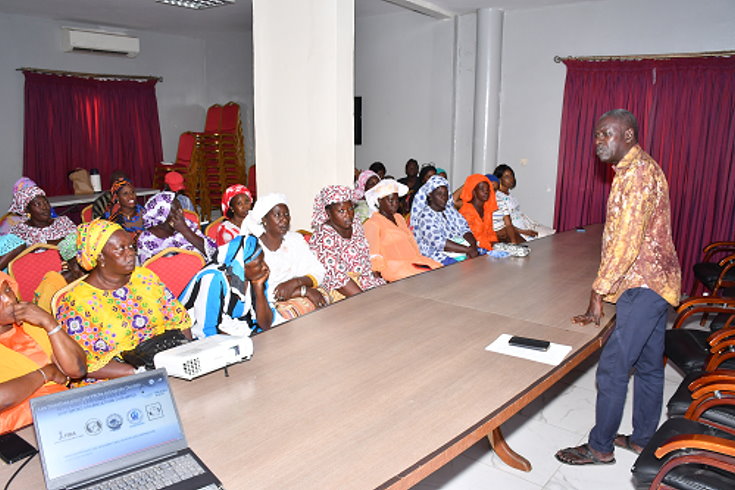World Fisheries Day by several sector organisations in Senegal
World Fisheries Day gave rise to several events in Senegal. In the face of the profound crisis of the sector engendered particularly by industrial overfishing and poor governance, several sector organisations demanded a stop to more industrial fishing licences, catching juveniles, and the construction of more fishmeal factories that jeopardise the availability of affordable fish food to the local population. Access to small pelagics like Sardinella and Ethmalosa need to be reserved for local operators to make sure women can earn a living in postharvest activities and sustain their families. The professional organisations also express their great concern about irregular emigration.
Click on the picture to access the YouTube video with the declaration delivered by Abdoulaye Ndiaye towards the government to bring the sector back towards viable pathways or click here for the memorandum with an analysis of the issues and the urgent demands launched. Abdoulaye Ndiaye heads the Ocean Campaign of Greenpeace Africa and was the speaker for the coalition of organisations celebrating this 'dark day' for fisheries in Senegal.
The nine key demands are as follows:
1. Freeze the granting of any new industrial fishing licenses on fully exploited and overexploited stocks;
2. Reserve the exploitation and marketing of Sardinella and Ethmalosa (bonga shad) exclusively to national players for the supply of the national market in order to strengthen national food security and job creation;
3. Increase the representation of fishing professionals in management bodies (CNCPM, CCALP, and other commissions);
4. Implement the recommendations of the consultations on Fish Meal and Fish Oil Factories (UFHP), in particular the issuance of the order for freezing authorizations for the establishment of all new fish meal and fish oil units and the audit of existing ones;
5. Take sustainable fisheries management measures to eradicate irregular emigration;
6. Carry out an independent evaluation, by the Senegalese side, of the Fisheries Agreement with the European Union (EU) before any negotiations for the renewal of the fisheries agreement can be granted and share the results with stakeholders;
7. Strengthen research and popularise the results with stakeholders (professionals, fisheries administration, etc.);
8. Professionalize the artisanal fishing sector and generalise job cards (for fish mongers, women processors, artisanal fishermen, etc.); and
9. Implement international standards and good practices for fisheries transparency.
Also on 21 November 2023, in Hann Bel Air, Aliou Sall of Mundus maris had convened a groupe of women in the community who had discussed their grievances for a long time already. They complain about being displaced from their traditional working spaces without compensation to make room for a huge refrigeration complex by a foreign investor. Overfishing, particularly through industrial vessels have brought the resource to its knees and many boats will not even take to the sea for fishing because the scarce catches do not cover operating costs.
 The increasing catches of juvenile small pelagic fish means, what remains of the fishery is rapidly destroying its own future. That means many women here and in other places are out of work.
The increasing catches of juvenile small pelagic fish means, what remains of the fishery is rapidly destroying its own future. That means many women here and in other places are out of work.
Mundus maris has developed, together with others concerned about the future of fishing, the FishBase app. The scan of the QR code to the right will install the app on any Android device. Chosing a country will download all recorded information relevant for this country so that it is not necessary to be permanently connected to the internet. Chose your language and off you go.
The app allows to search the country information extracted from the global information system on all fish species known to science by common fish name in any language. Pick the one of interest and you get the picture and the minimum reproductive size of the fish and a few other basic info of relevance to check whether the size composition of landed fish are babies or adults.
By looking at the optimum size, users seeing lots of juveniles can get a sense of the waste and loss of potential harvest in the near future. It should help to prevent a sense of powerlessness in the face of mismanagement. Anyone can see what ought to be fished and what not and demand sustainability practices with proper oversight by the administration.
Right now, what little gets landed may end up in fishmeal factories or in channels controlled by investors from outside the community. Not earning their living, the families are in distress. That dwarfs even basic concerns the women had for years already, because the lack of accessible toilets and even basic anemities affected their working conditions and health. With one administrative 'explanation' or another, no administration was willing to ensure their rights. Recently, security became even more of a problem than it was before the expulsion. Near their stalls drug trafficking, thugs and theft abound even putting their lives at risk. It's an outright scandal.
 The meeting on 21 November with financial support by Mundus maris, focused on making the Voluntary Guidelines for Assuring Sustainable Small-Scale Fisheries a reality. Many women were still not properly informed about the human rights provisions and the concrete measures promoted by the SSF Guidelines, which the Senegalese government had publicly promised to adopt. Therefore a video with Wolof voice over filled in this information gap. The women also watched the documentary by ZIDEOPROD in Senegal, co-sponsored by Mundus maris, "Golden fish, African fish" to get an overview about all elements of the value chain. The film won dozens of prizes in international film festivals and was translated into several languages. The participants could see how a few years ago, the installation of foreign owned fish meal factories in Kafountine destroyed a productive local and regional economy around catches of small pelagics, locally processed and marketed all over the region into the Sahel. This sort of destruction is now being generalised and it's high time to oppose even worse excesses. The export orientation at the expense of meeting even basic local needs must not continue unchecked.
The meeting on 21 November with financial support by Mundus maris, focused on making the Voluntary Guidelines for Assuring Sustainable Small-Scale Fisheries a reality. Many women were still not properly informed about the human rights provisions and the concrete measures promoted by the SSF Guidelines, which the Senegalese government had publicly promised to adopt. Therefore a video with Wolof voice over filled in this information gap. The women also watched the documentary by ZIDEOPROD in Senegal, co-sponsored by Mundus maris, "Golden fish, African fish" to get an overview about all elements of the value chain. The film won dozens of prizes in international film festivals and was translated into several languages. The participants could see how a few years ago, the installation of foreign owned fish meal factories in Kafountine destroyed a productive local and regional economy around catches of small pelagics, locally processed and marketed all over the region into the Sahel. This sort of destruction is now being generalised and it's high time to oppose even worse excesses. The export orientation at the expense of meeting even basic local needs must not continue unchecked.
With that the women decided to have another meeting at the end of the week to discuss the issues further and decide on what action to take to push for meeting their demands.
Meanwhile, the Open Letter of RISE UP demanding seats at the table where decisions are being taken on the governance of fisheries and the ocean was sent to the Ministry for Fisheries and Marine Economy of the country.










